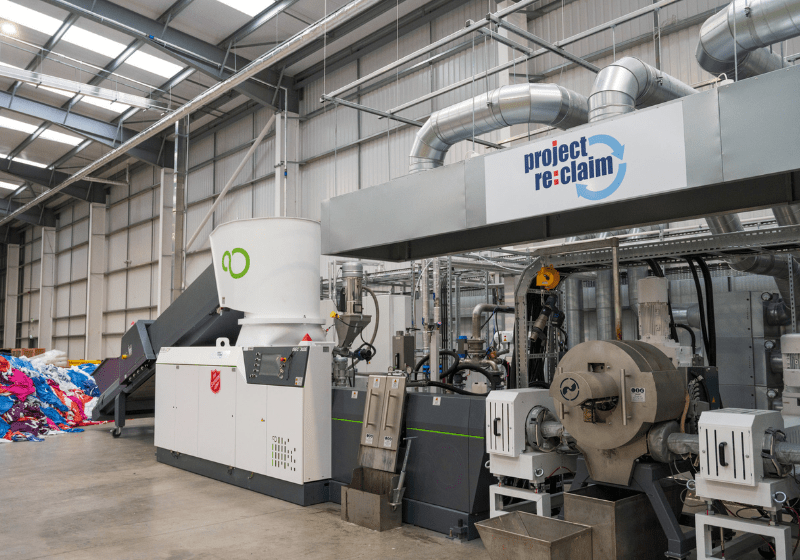Project Re:claim, a groundbreaking new polyester recycling plant in Kettering, Northamptonshire, is pioneering the use of zero-emission hydrogen power technology to address the pressing issue of polyester textile waste. This innovative project, a joint venture between the Salvation Army Trading Company Ltd (SATCoL) and Project Plan B, is set to drive the industry towards a circular economy. GeoPura, a leader in sustainable energy solutions, is providing the critical power needed to support this transformative initiative from green hydrogen.
GeoPura’s Hydrogen Power Units (HPUs) are providing zero-emission electricity generated via green hydrogen to support the initial phase of Project Re:claim. Until a suitable grid connection is established, which may take 12-18 months, the GeoPura hydrogen-powered generators are ensuring the site has a reliable, sustainable power supply that can withstand the demands of the plant. The only output is water.
Tim Cross, CEO of Project Plan B, highlighted the project’s significance and the challenge of securing sufficient power, stating, “In the UK alone, 300,000 tonnes of textile items are discarded into household waste, including polyester. Up until now, polyester that had no useful life left would have been disposed of.
“A significant challenge in launching Project Re:claim was ensuring we had enough power to operate sustainably from the outset. GeoPura’s hydrogen power solutions have been instrumental in overcoming this hurdle, enabling the plant to operate efficiently without relying on fossil fuels. This not only aligns perfectly with our mission to create a circular economy for textiles but also sets a precedent for future recycling initiatives to follow.”
Project Re:claim, is the first commercial-scale, post-consumer polyester recycling plant of its kind in the UK. The plant is designed to recycle post-consumer garments and other textiles, transforming them into raw materials that can be reintroduced into the fashion and textiles industries. Powered by GeoPura’s clean energy, the plant is set to recycle 2,500 tonnes of polyester waste this year, with a target of 5,000 tonnes in the second year.
“By harnessing green hydrogen, our HPU technology provides zero-emission electricity, making it an ideal solution for projects like Re:claim, where traditional grid connections of sufficient size are not immediately available,” said Andrew Cunningham, CEO of GeoPura. “Our involvement in this project highlights the versatility and reliability of hydrogen power, particularly in accelerating the transition to sustainable energy and reducing reliance on high-polluting diesel fuels which may otherwise be utilised for off-grid power in these scenarios.
“It’s fantastic to be working with Project Re: claim and to see their commitment to seeking alternative power sources that align with their sustainability goals work out so well.”
The collaboration between GeoPura and Project Re:claim, exemplifies the power of strategic partnerships in driving sustainable development. By integrating GeoPura’s innovative hydrogen technology, the project not only addresses the urgent issue of textile waste but also sets a benchmark for future recycling initiatives that can be powered sustainably.
GeoPura HPU technology harnesses green hydrogen to provide zero-emission electricity, augmenting the grid where local supply is insufficient and replacing diesel generators. With operations across the UK, GeoPura is mass manufacturing HPUs in collaboration with Siemens Energy and plans to deploy over 3,600 HPUs by 2033, displacing more than ten million tonnes of CO2 emissions.

